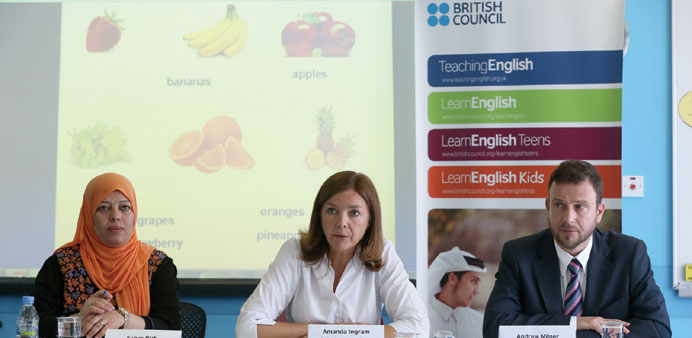Ingram, flanked by Rizk and Milner, announces the changes in the academic calendar and programmes at British Council Qatar. PICTURE: Jayan Orma
By Joseph Varghese/Staff Reporter
The British Council Qatar has introduced several changes in its academic calendar and programmes with effect from next month.
“There will be four terms in the academic year from September, instead of the current three,” English Language Services director Amanda Ingram told a press conference yesterday.
There is a winter break at the end of January, matching other educational institutions in Qatar. The academic year will conclude by May end, to provide adequate time for the students to concentrate on the end-of-year exams in their schools.
The Council is also offering special, additional sessions to adult learners in a range of skills such as conversation, business workshops and IELTS writing courses to supplement the popular English for Life, English for Business, and IELTS preparation courses.
“The changes, introduced after conducting a research amongst our students, will bring a host of benefits for students over the next academic year,” explained Ingram.
“By completing more terms in the year, students will be able to complete an English level every year. The changes give adult students the opportunity to study more hours each week resulting in faster progress and allowing them to achieve their goals within a shorter period of time.”
The British Council official stressed that the programmes for young learners will now complement the school calendar to reduce the clash with exams. “We have also responded to increased demand for young learner programmes and introduced additional age-groups and even more refined levels.”
Ingram claimed the teachers at the Council are the most qualified and experienced.“We also provide interactive teaching boards; online learning facilities for all age groups; mobile learning apps and the use of iPad for learning,” she said. The Council will be able to accommodate about 1,500 students per term, totalling 6,000 per year. Presently, about 40% of the young learners and 25% of the adult learners are Qatari.
The organisation charges QR 2,200 for young students and QR 2,700 for adult learners per term, according to deputy teaching centre manager Andrew Milner. Senior teaching trainer Sahar Rizk was also present.
Fake IELTS certificates ‘can be easily detected’
Some cases of fake certificates of the International English Language Testing System, popularly known as IELTS, have come to the notice of British Council in Qatar, an official disclosed yesterday. Speaking to Gulf Times, Amanda Ingram, director of English Language Services at British Council Qatar said that the universities have the easiest way to check the authenticity of the certificate. Ingram said: “We have come across some fake IELTS certificate cases, but not many.They are the most controlled certificates in the world. The universities can go online and check the authenticity using the details of the candidate. It is a signal of how good the IELTS security is.” An IELTS trainer at the British Council explained about how the system works. “Everything is streamlined and everything can be authenticated online.They can check online through a secured server and can find out the authenticity using the name and the passport number of the applicant.The only thing is that the university must be registered with the British Council and most universities are registered with the Council.” “On the day of the test, we take photographs and fingerprints of the candidates. We can verify any duplication with these pieces of evidence. In some cases, we also have the CCTV footage and the recordings are kept for three years,” he added. Ingram said that it was for the universities to take action if they get any fake certificates from the applicants. She said: “The universities can go for legal action as it is cheating. As such, I am not aware of any action taken by any university in Qatar.”

